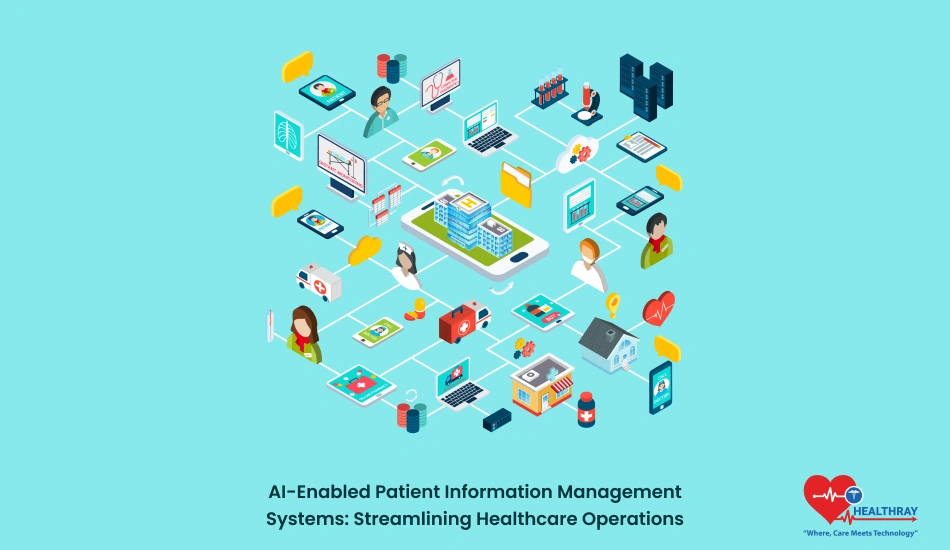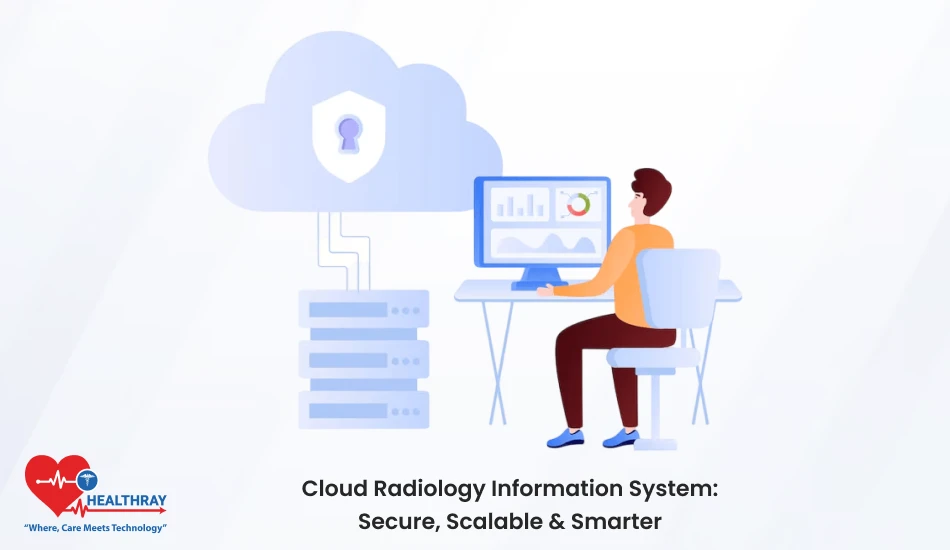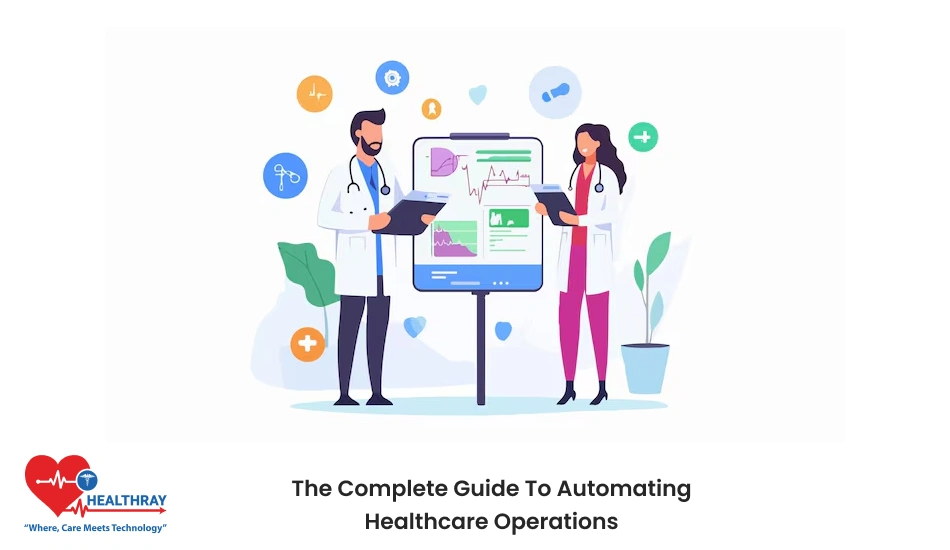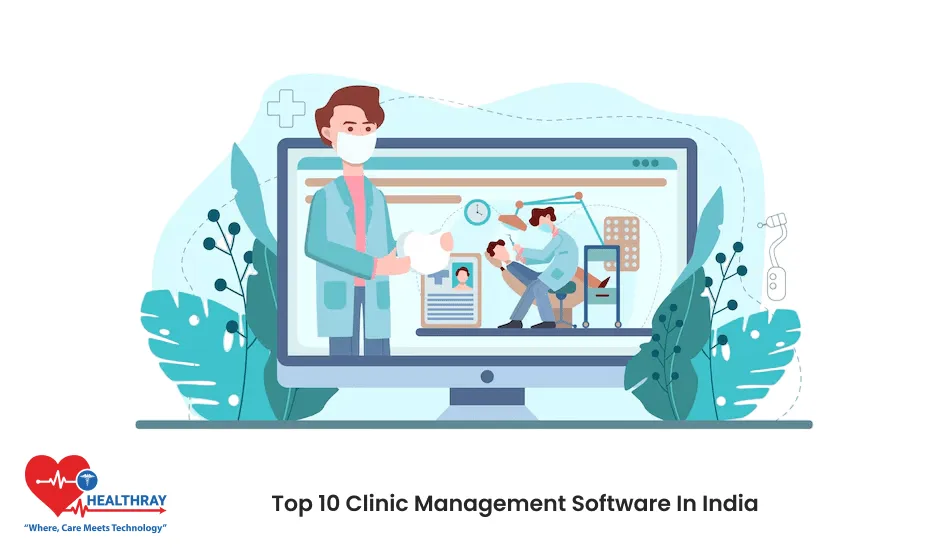Managing patient information is one of the most challenging aspects of modern healthcare. With an ever-growing volume of data and increasing demands for efficiency, healthcare professionals are searching for smarter ways to handle these operations. AI-enabled patient information hospital management software offer a transformative solution.
These systems do more than just store data—they analyze, predict, and optimize processes in real time. They help reduce errors, improve patient care, and ensure smooth operations. But how do they work, and what steps can healthcare teams take to implement them effectively?
This post dives into how AI is reshaping patient information management, the benefits it brings, and strategies to adopt it in healthcare operations. If you’re curious about cutting-edge tools and want to explore how they can fit into your organization, you’re in the right place. Let’s break it all down.
Why AI in Patient Information Management?
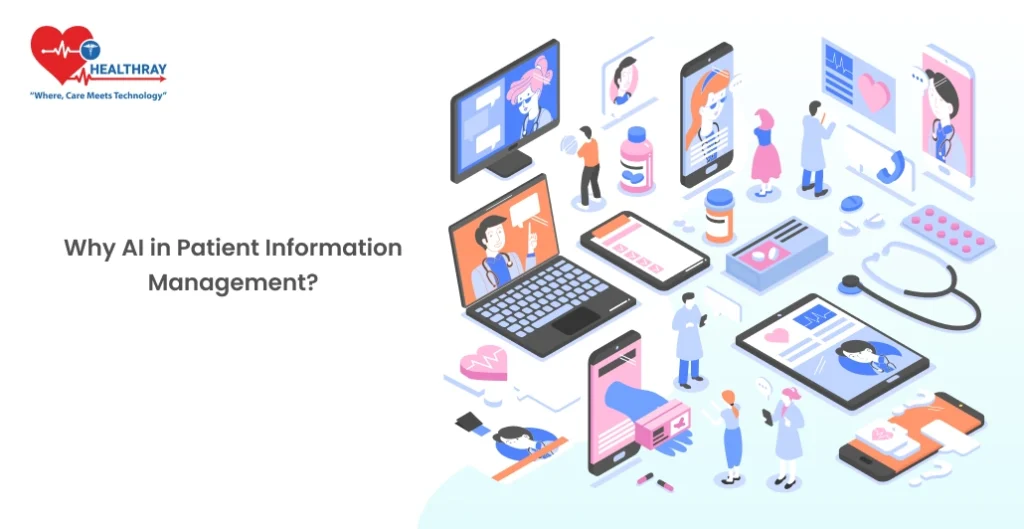
Healthcare operations are more complex than ever. Managing patient information is no longer just about filing reports or updating databases. The sheer volume of data, coupled with the need for accuracy and speed, can overwhelm even the most efficient teams. This is where AI steps in to transform how patient information is handled.
AI-enabled systems are not just about automation. They bring intelligence to data management by analyzing patterns, identifying trends, and predicting outcomes. For example, they can detect potential health risks before they become emergencies or flag discrepancies in patient records that might otherwise go unnoticed.
By addressing key challenges like data overload, administrative bottlenecks, and compliance demands, AI systems offer a solution that goes beyond efficiency. They create a foundation for smarter, more patient-focused care.
Key takeaways:
- AI systems handle data processing and analysis faster than traditional methods.
- They reduce errors, enhancing the reliability of patient information.
- They free up time for healthcare professionals to focus on patient care.
Core Benefits of AI-Enabled Systems
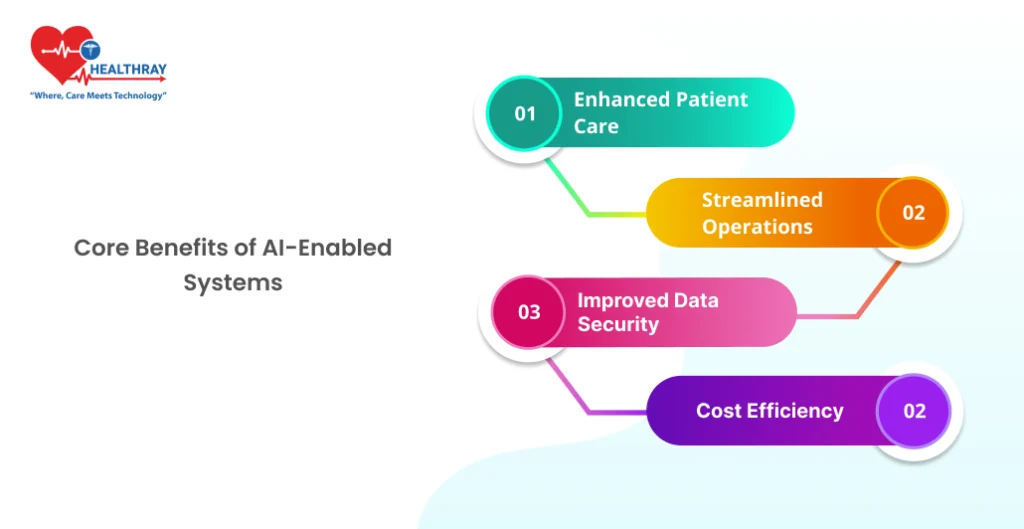
AI-enabled patient information management systems aren’t just a technological upgrade; they’re a game-changer for healthcare operations. Here’s how they deliver value to healthcare teams and patients alike:
Enhanced Patient Care
AI systems analyze patient data in real time, offering insights that help doctors make quicker, more informed decisions. For example:
- Early Diagnosis: AI can identify patterns in patient records that point to early signs of illnesses, enabling preventive care.
- Personalized Treatment Plans: By studying historical and real-time data, AI tailors treatment recommendations to individual needs.
Streamlined Operations
Administrative tasks often consume a large chunk of resources in healthcare. AI simplifies and speeds up these processes:
- Automated Scheduling: AI tools optimize appointments by reducing scheduling conflicts and maximizing the use of available resources.
- Billing Accuracy: By reducing errors in billing and insurance claims, AI helps hospitals software recover costs faster.
- Resource Allocation: AI predicts patient admission trends, enabling better management of beds, staff, and equipment.
Improved Data Security
Patient information is highly sensitive, and safeguarding it is non-negotiable. AI strengthens data protection by:
- Detecting Threats: AI identifies unusual activity in real time, preventing data breaches.
- Ensuring Compliance: It keeps systems aligned with healthcare regulations, reducing the risk of penalties.
- Encrypting Data: AI enhances encryption, making patient records secure from unauthorized access.
Cost Efficiency
While AI systems require an initial investment, the long-term benefits outweigh the costs:
- Lower operational expenses through automation.
- Reduced wastage of resources and time.
- Faster revenue cycles by minimizing billing and claim delays.
AI systems aren’t just tools; they’re strategic assets that empower healthcare organizations to focus on what matters most—delivering quality care.
Implementation Strategies for Healthcare Teams
Introducing AI into patient information management can feel overwhelming. However, with the right approach, healthcare teams can successfully integrate these systems to enhance efficiency and care quality. Here’s how to get started:
Assess Current Systems and Needs
Before diving into AI adoption, it’s critical to evaluate the existing infrastructure:
- Data Readiness: Ensure patient records are digitized and organized in formats compatible with AI tools.
- Operational Gaps: Identify processes that are time-consuming, error-prone, or inefficient—these are the best candidates for AI integration.
Choose the Right AI Solution
Not all AI tools are the same. Selecting the right system depends on the organization’s goals:
- Customizable Platforms: Opt for solutions that can be tailored to your specific needs.
- Vendor Reputation: Choose providers with a track record in healthcare AI.
- Interoperability: Ensure the AI system can integrate with your current software and hardware.
Collaborate with IT Teams
Successful implementation requires a partnership between healthcare administrators and IT professionals:
- Work together to create a rollout plan.
- Test the system on a small scale before full deployment.
- Ensure robust cybersecurity measures are in place to protect sensitive data.
Invest in Staff Training
AI adoption is only effective when staff can use it confidently:
- Training Programs: Provide hands-on training to help staff understand and operate the AI system.
- Continuous Support: Offer ongoing resources, such as help desks or manuals, to address any issues.
Monitor and Optimize
The work doesn’t stop after implementation. Regular monitoring ensures the AI system performs as expected:
- Performance Metrics: Track efficiency, error reduction, and cost savings.
- Feedback Loops: Gather input from users to identify areas for improvement.
- Software Updates: Keep systems up-to-date to leverage the latest advancements.
By following these steps, healthcare teams can ensure a smooth transition to AI-enabled systems and maximize their benefits.
Addressing Common Challenges
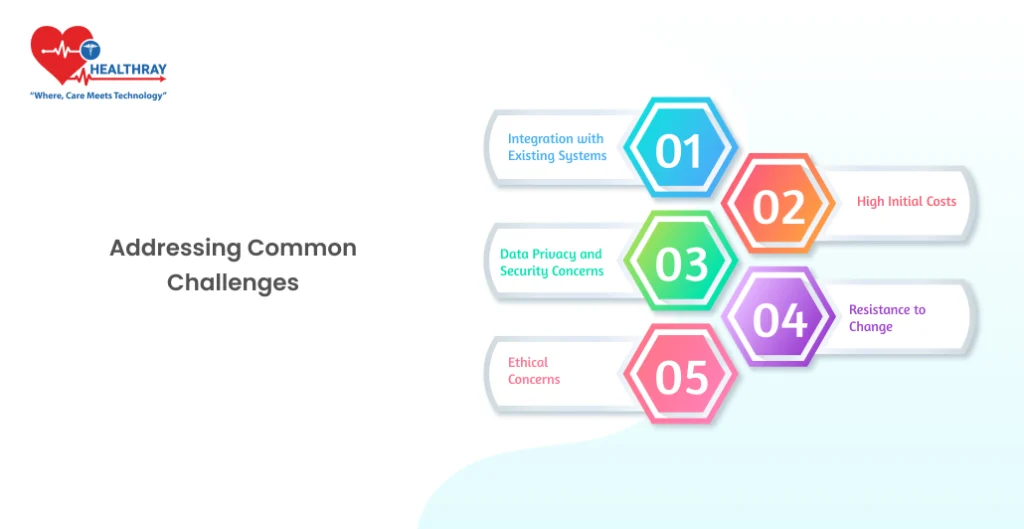
While AI-enabled hospital administration software offer immense potential, they also come with a unique set of challenges. Understanding and addressing these obstacles early can ensure a smoother implementation process.
Integration with Existing Systems
Many healthcare facilities rely on legacy systems, which may not easily connect with modern AI platforms. This can result in data silos and inefficiencies. To overcome this:
- Opt for AI solutions designed with interoperability in mind.
- Collaborate with IT teams to create middleware that bridges gaps between old and new systems.
- Gradually phase out outdated systems to minimize disruptions.
High Initial Costs
AI systems often require significant upfront investment for software, hardware, and training. However:
- Conduct a cost-benefit analysis to highlight potential savings in operational efficiency and error reduction.
- Look into grants, partnerships, or financing options to offset costs.
- Emphasize the long-term return on investment through improved workflows and patient outcomes.
Data Privacy and Security Concerns
Handling sensitive patient information is one of the biggest responsibilities in healthcare. AI systems must meet stringent security standards. Steps to address this include:
- Ensuring compliance with regulations like HIPAA.
- Implementing robust encryption and multi-factor authentication protocols.
- Partnering with vendors that prioritize cybersecurity and provide regular updates.
Resistance to Change
Staff and administrators may hesitate to adopt AI due to fears of job displacement or a lack of technical expertise. To manage this:
- Clearly communicate that AI is meant to assist, not replace, staff by automating repetitive tasks.
- Offer comprehensive training and hands-on workshops to build confidence.
- Highlight success stories where AI has improved both staff workflows and patient care.
Ethical Concerns
AI decision-making can raise ethical questions, particularly in areas like patient prioritization or treatment recommendations. To navigate these:
- Set clear guidelines on how AI systems should operate and the role of human oversight.
- Ensure transparency in how AI processes data and makes recommendations.
- Maintain a balance where AI provides support but critical decisions remain with healthcare professionals.
By proactively addressing these challenges, healthcare organizations can pave the way for successful AI adoption, unlocking the full potential of these transformative systems.
Regulatory and Ethical Considerations
AI-enabled patient information management systems must operate within the boundaries of strict healthcare regulations while upholding ethical standards. Ensuring compliance and trust is crucial for successful implementation and adoption.
Regulatory Compliance
Healthcare data is one of the most sensitive types of information, and its management is governed by strict laws. Here’s how to ensure compliance:
- HIPAA Standards: Systems must meet requirements for data storage, access, and transmission. This includes encryption and secure access protocols.
- GDPR (if applicable): For organizations handling data in regions covered by the General Data Protection Regulation, AI systems must comply with its stringent privacy rules.
- Regular Audits: Conduct frequent compliance checks to ensure the AI system adheres to the latest regulations.
Data Privacy
Patient trust hinges on the assurance that their personal information is secure. Key privacy measures include:
- Consent Management: Ensure patients have control over how their data is used. AI systems should include clear consent workflows.
- De-Identification: Use anonymization techniques to protect patient identities in research or data sharing scenarios.
Transparency in Decision-Making
AI systems can sometimes act as a “black box,” making it hard to understand how decisions are made. Transparency is essential to build trust:
- Provide explainable AI outputs so healthcare teams can understand the reasoning behind recommendations.
- Clearly document the algorithms and data sources used in AI systems.
Human Oversight
While AI can analyze vast datasets and provide recommendations, it should never replace human judgment:
- Establish protocols that ensure critical decisions are reviewed by qualified professionals.
- Maintain a balance where AI supports staff, rather than taking over patient care processes.
Ethical Considerations
AI systems must be designed and implemented with ethics in mind:
- Bias Mitigation: Regularly evaluate AI algorithms to ensure they do not reinforce biases in patient care or treatment recommendations.
- Fair Access: Ensure that AI benefits all patients equally, regardless of socioeconomic status or other demographic factors.
- Accountability: Clearly define who is responsible for AI-driven decisions, especially in the case of errors.
Training and Awareness
Staff must understand the regulatory and ethical implications of using AI systems:
- Provide education on compliance standards and ethical practices.
- Encourage an organizational culture of accountability and continuous learning.
By addressing these regulatory and ethical considerations, healthcare teams can implement AI systems responsibly and maintain the trust of both patients and staff.
Case Studies and Real-World Applications
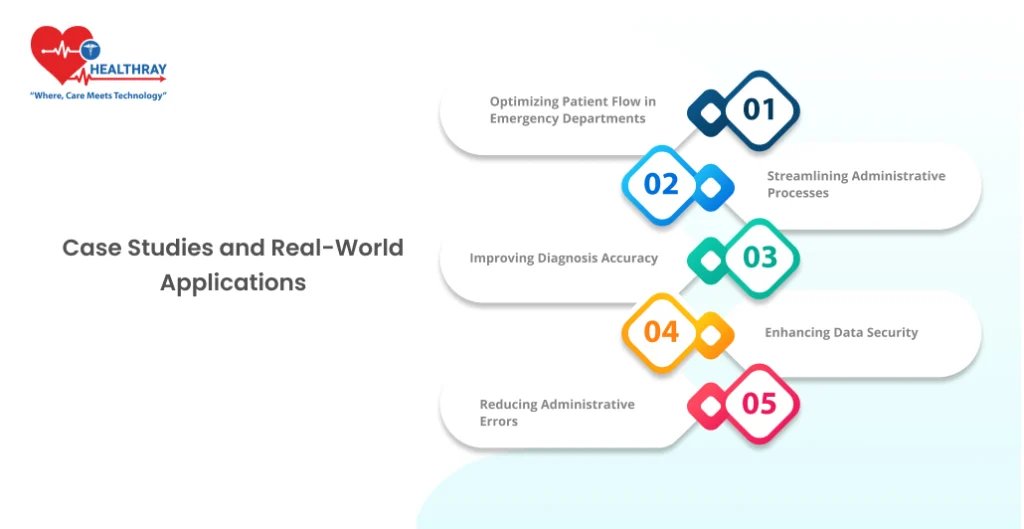
AI-enabled patient information management systems have already made their mark in healthcare, proving their potential to improve efficiency and care quality. Here are some examples of how organizations have successfully implemented these systems:
Optimizing Patient Flow in Emergency Departments
A major hospital system introduced an AI-driven solution to predict patient admission rates and optimize resource allocation.
- Outcome: The AI tool helped reduce wait times by 25% and improved patient satisfaction scores. It achieved this by analyzing historical data and real-time inputs, allowing the hospital to staff emergency rooms effectively and manage bed availability.
Streamlining Administrative Processes
A mid-sized healthcare facility implemented an AI-based scheduling system to manage appointments and reduce no-shows.
- Outcome: The system identified patterns in patient behavior and suggested optimal appointment times. This reduced missed appointments by 30%, improved resource utilization, and increased revenue from better capacity management.
Improving Diagnosis Accuracy
A leading oncology center adopted an AI tool to analyze patient data and identify early signs of cancer.
- Outcome: The AI system had a 90% success rate in detecting early-stage cancer, outperforming traditional diagnostic methods. Doctors used the insights to begin treatments earlier, significantly improving patient outcomes.
Enhancing Data Security
A healthcare network facing frequent cybersecurity threats integrated an AI-enabled threat detection system.
- Outcome: The system identified suspicious activity and stopped data breaches before they occurred. This not only safeguarded sensitive patient data but also ensured compliance with stringent healthcare regulations.
Reducing Administrative Errors
A large hospital group adopted AI to streamline billing and claims processing.
- Outcome: Billing errors decreased by 40%, and claim denials dropped significantly. The hospital recovered payments faster and reduced administrative workloads, allowing staff to focus more on patient care.
- AI excels when applied to repetitive, high-volume tasks like scheduling and billing.
- It significantly enhances decision-making in clinical and operational settings.
- Success depends on choosing the right tool and ensuring staff are equipped to use it effectively.
These real-world examples demonstrate the tangible benefits of AI in healthcare. They also underline the importance of careful planning and ongoing support for successful implementation.
Future of AI in Healthcare Operations
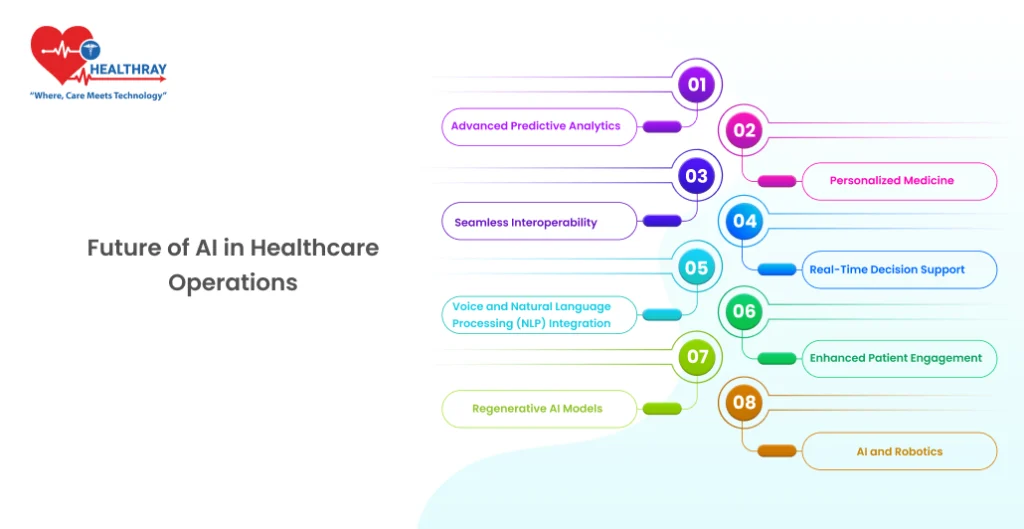
The role of AI in healthcare is still evolving, and the future holds immense potential for transforming patient information management and beyond. Here’s a glimpse into what’s on the horizon:
Advanced Predictive Analytics
AI will continue to enhance its ability to predict health trends and patient outcomes. By integrating wearable devices, patient portals, and historical data:
- Chronic Disease Management: AI could predict flare-ups for conditions like diabetes or hypertension, allowing for preemptive care.
- Pandemic Preparedness: Advanced modeling can predict disease outbreaks and help allocate resources accordingly.
Personalized Medicine
The future of healthcare will lean heavily on AI to deliver individualized treatment plans:
- AI systems will analyze genetic, environmental, and lifestyle data to recommend precise treatments.
- Virtual health assistants might guide patients through their care plans, making adjustments based on real-time data.
Seamless Interoperability
AI will play a key role in breaking down data silos and ensuring seamless communication between disparate systems:
- Unified Patient Records: AI will integrate data from various sources, providing healthcare professionals with a holistic view of patient health.
- Cross-Organization Collaboration: Systems will enable hospitals, labs, and pharmacies to share information securely and efficiently.
Real-Time Decision Support
AI’s ability to process vast amounts of data in real time will transform decision-making:
- Emergency rooms will use AI to triage patients more effectively.
- Surgeons may rely on AI to provide real-time insights during procedures.
Voice and Natural Language Processing (NLP) Integration
AI-powered voice and NLP tools will revolutionize how healthcare professionals interact with patient data:
- Doctors will dictate notes, and AI will automatically update patient records.
- NLP will extract critical insights from unstructured data like medical journals and clinical notes.
Enhanced Patient Engagement
AI will foster stronger connections between healthcare providers and patients:
- Chatbots and Virtual Assistants: These tools will answer patient queries, remind them about appointments, and provide health tips.
- Gamification of Health Management: AI-driven apps may motivate patients to adhere to treatments through interactive and rewarding experiences.
Regenerative AI Models
Regenerative AI, a growing field, will drive innovative solutions:
- Generating realistic patient data sets for training AI models without compromising privacy.
- Creating simulations to test new treatment protocols or management strategies.
AI and Robotics
The integration of AI with robotics will redefine how surgeries and routine tasks are performed:
- Robots guided by AI will assist in surgeries with unmatched precision.
- Autonomous bots may handle administrative tasks, such as delivering supplies or sorting documents.
The future of AI in healthcare operations promises more efficiency, better outcomes, and stronger patient-provider relationships. While challenges like ethical considerations and cost barriers remain, the pace of innovation suggests that AI will continue to be a cornerstone of modern healthcare.
Conclusion
AI-enabled patient information management systems are reshaping the way healthcare facilities operate. By automating tedious tasks, enhancing data security, and providing actionable insights, these systems empower healthcare professionals to focus more on delivering quality care.
Implementing AI isn’t without challenges, but with a clear strategy, robust training, and careful system selection, these hurdles can be overcome. Whether it’s streamlining operations, predicting patient needs, or ensuring compliance, AI is proving to be an invaluable asset in modern healthcare. For healthcare administrators, IT professionals, and Hospital Information System teams, the future of patient information management is about more than efficiency—it’s about creating a seamless, patient-centric experience. As the technology continues to evolve, early adopters will find themselves leading the charge toward a smarter, more connected healthcare system.
